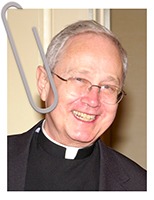Heard any really “shocking statements” in the last 24 hours?
The front pages of tabloid newspapers scream shocking statements. News pundits and internet “influencers” specialize in shocking “clickbait headlines.”
Have you been shocked by the bombing of maternity hospitals and police seeming to wait for orders from someone higher up while children in classrooms are being shot?
Now for the “trick question”!
What is the most radical or shocking statement you hear… but maybe do not consider shocking?
In this Vincentian Mindwalk, I invite you to consider two words we commonly use in prayer. Jesus asked his followers to pray OUR Father. I am coming to realize that OUR Father is not just a memorized formula or ritual title. Believing… and living accordingly… these words are a truly radical challenge for each and every one of us
We miss their radicality because we focus on the second word… “Father” and gloss over the implications of “OUR.” We unconsciously think of MY father.
Is the “OUR Father” a Challenging Prayer?
It was for the early followers of Jesus! They missed the significance of praying OUR Father as Jesus taught them to pray
Just ask the shocked hearers of the parable of the Good Samaritan.
The Good Samaritan is a story about taking care of someone who is your sworn enemy! It unpacks the radical meaning of OUR. We are our brother’s keeper regardless of bloodline or belief.
We have tamed the story of the Good Samaritan!
If we understand how hated a Samaritan was, we see Jesus challenging his listeners to be neighbors who care for and come to one another’s aid even if not friends or even “good” people.
Don’t we tend to think about our brothers and sisters as more than mere neighbors?
In this shocking parable, Jesus challenges us to accept each as our brothers and sisters, especially when in need.
I suggest reading Pope Francis’ insightful commentary (paragraphs 56-86). It is not for the faint of heart.
Radical Implications
Jesus asks us to be present to each person in need of help, regardless of whether they belong to our social group or bloodline. That is a shock whether we call ourselves religious or not, Republicans or Democrats, Proud Boys or Black Lives Matter. Christian, Non-Christian or None” It is a shock!
Jesus concludes the parable by saying: “Go and do likewise” … be a neighbor to the other. (Lk 10:37). These words echo his command at the last supper… “Do this in memory of me”… Wash one another’s feet.
Of course, in the background lurks the realization that God sets the example in the person of Jesus. His example challenges all of us who have so little understanding of this radical challenge to how we think of many degrees of relationships or being neighbors.
Just think of their disbelief after Jesus’ crucifixion. We still struggle to understand that Jesus would die for everyone, including all his brothers and sisters who caused or cheered his suffering!
The journey from “my” to “our” Father
In the remaining chapters of his encyclical, Pope Francis unpacks the societal implications of the story of those who fall by the wayside of who we value as neighbors, much less sisters and brothers.
Fratelli tutti is not about making adjustments here and there to our personal and communal lives. Rather it is nothing less than a way to reread and to live the Gospel for our times.
In telling the story of the Good Samaritan Jesus was describing himself and his mission to bring healing not only to the polarized world of his day but to ours!
Is this “Good News” not more shocking than any of our shocking headlines?
Personal questions
- How conscious am I of my brothers and sisters when I pray OUR Father as Jesus asked?
- What are the challenges I face in living this shocking way of thinking?
Click below for an early version of this Vincentian Mindwalk


Great meditation on loving my brothers and sisters “as” they come into my life: friends and/or foes.
I’m asking God, Our Father, to help me.
Thank you for this moment of renewed conversion for me.